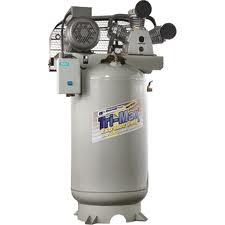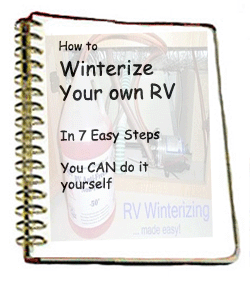RV Winterizing Methods
To Blow or Not to Blow?
Using an air compressor to blow out your RV water lines vrs winterizing with RV antifreeze.
The debate rages on, as it has for years - Do I blow out the water lines with compressed air or use RV antifreeze to winterize the RV water system.
Many people argue that they have "blown out my RV water lines for umpteen years, and never had a problem"
This article is meant to express my opinion, as a certified RV technician (15+ years), who has personally winterized in excess of 3000 RV's over the years.
1. Compressed air does push most of the water out of the lines, but not all. Any remaining water does what water naturaly does - it runs downhill and collects in the lowest point. RV plumbing has many up and downs as it runs through various cabinets and over various obstacles and the water that collects at these places will freeze.
2. The compressed air does not blow out the water that is inside the water pump. It can't do this because the pump has internal valves to prevent backflow and is designed this way.
3. Air compressor air can be dirty and contaminated with traces of oil - without a very good filter, do you want this in your water lines?
 The last dealership I worked for was very committed to keeping the air system
clean. We had all the newest filters, water removers and such, and drained the compressor daily. Even then,
the water that came out of the compressor was disgusting! Oil and rust and other nasty's.
The last dealership I worked for was very committed to keeping the air system
clean. We had all the newest filters, water removers and such, and drained the compressor daily. Even then,
the water that came out of the compressor was disgusting! Oil and rust and other nasty's.
Many shops drain the system weekly or maybe when they think about it! And many don’t have water traps or old compressors that leak oil into the system. I, personally, would not like to have that air blowing through my water lines. Make sense?
4. RV water systems are designed to operate at 45 PSI pressure - any air pressure used should be regulated to not exceed 45 PSI - you can't just run down to the gas station and use the tire filler to blow out your RV lines!
5. Most RVs will take about 2 gallons of antifreeze to winterize - at $2.50 or $3.00 a gallon, that's 5 or 6 bucks. And the time for either method is about the same.
I live and work in central BC, Canada where winter temperature go to -30 and lower. I have worked for 4 separate RV dealers in my career and all of them use the antifreeze method to winterize the lot units. (maybe 100 to 300 RVs per dealer!) The cost to winterize these units with antifreeze is substantial. If they could just "blow out the lines" don't you think they would do that?
The final choice is up to you, of course, but I am reminded of that old TV comercial slogan - "pay me now or pay me later!"
 "How to Winterize Your Own RV in 7 Easy Steps" is a downloadable manual with step by step
pictures and video - You can do-it-yourself!
"How to Winterize Your Own RV in 7 Easy Steps" is a downloadable manual with step by step
pictures and video - You can do-it-yourself!
Now FREE for my readers. Immediate download!